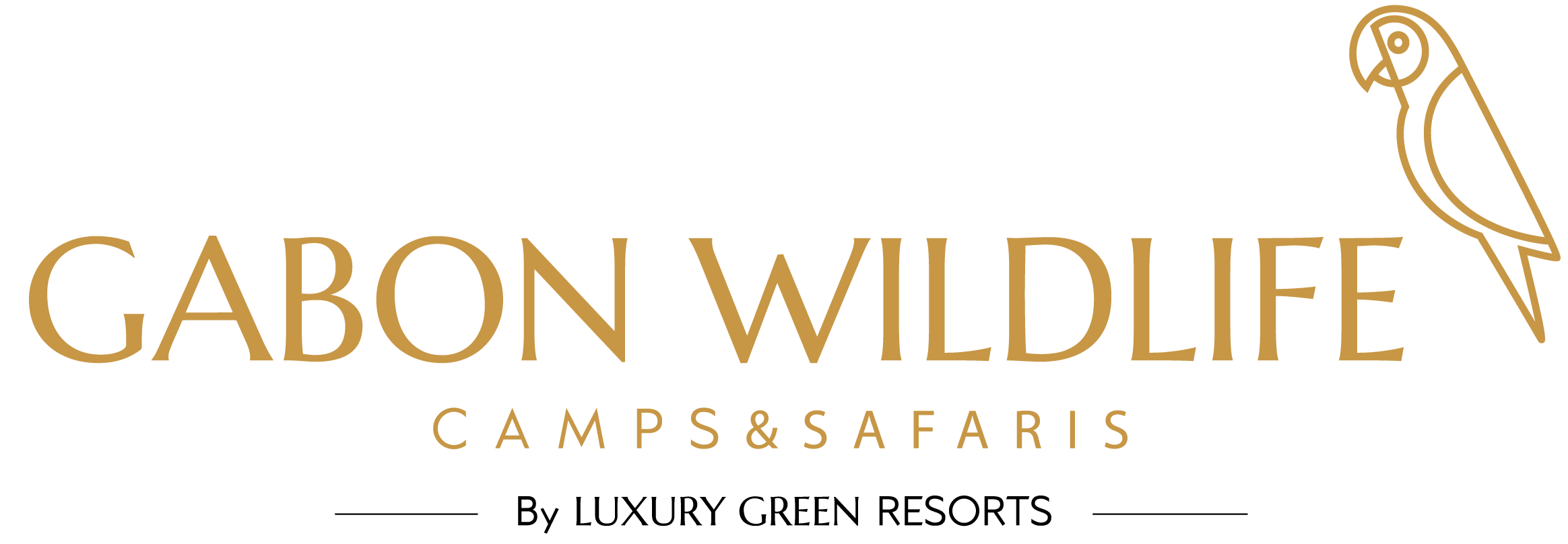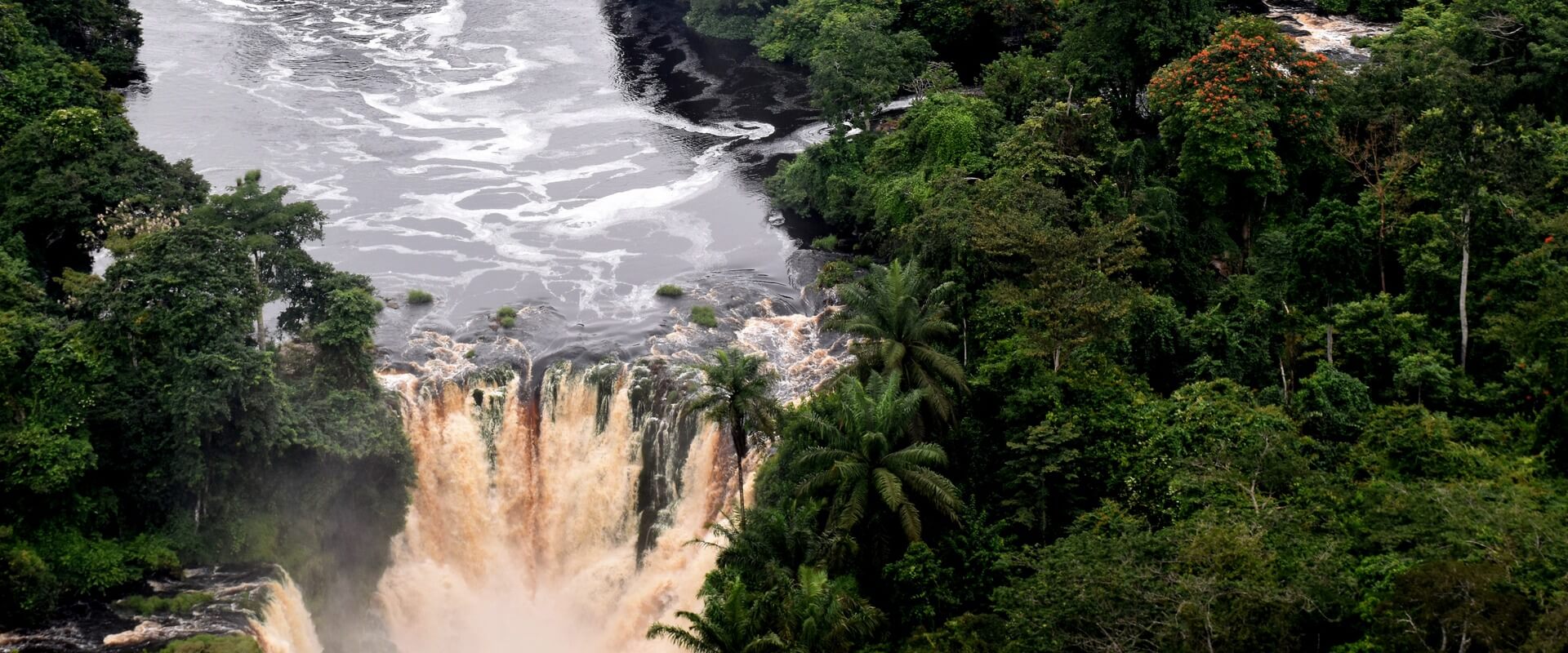
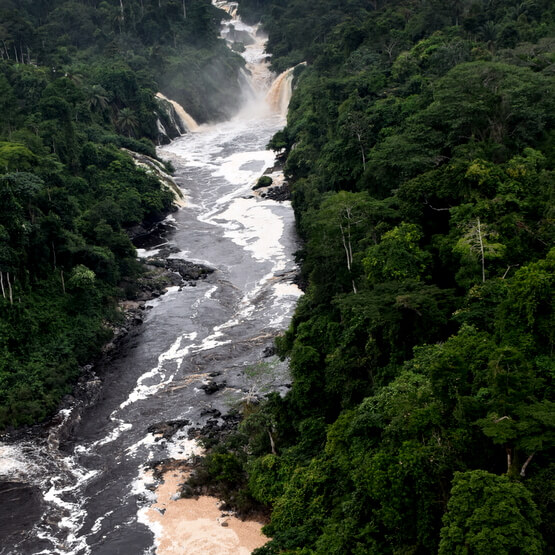
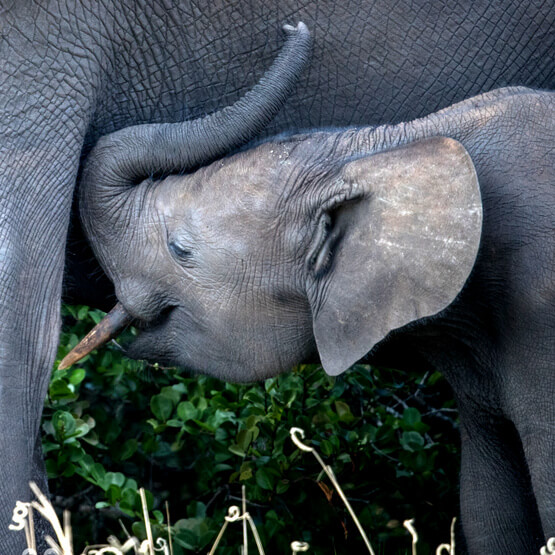
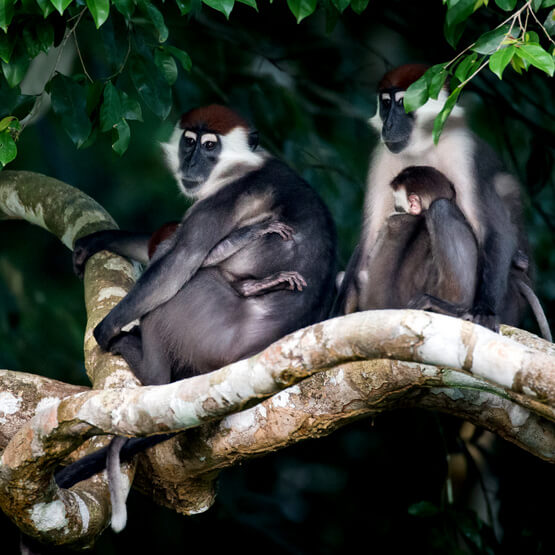
Ivindo National Park
With its tangled rainforests, legendary rivers and thundering waterfalls; Kongou, Mingouli and Djidji — the Wonders of Ivindo — Ivindo National Park unveils some of Gabon‘s most extraordinary and hidden biodiversity. Yet, little disturbs its reverie except for the magnificent wildlife that amass in the forests, along the river banks and at Langoué Baï — the fifth largest forest clearing in equatorial Africa and one of the most pristine ecosystems in the world. From a safe distance, you will see a gathering of forest elephants, western lowland gorillas, chimpanzee and a multitude of other exotic species including new and old world monkeys and hundreds of birds — even the rare pangolin, golden cat or a leopard, or two. There’s always neverending big-game viewing at every turn. And when you journey by drift boat, pirogue or on foot, you will also discover artisanal traditions embedded deep in the forest — masked places where ancient tribal spirits from the past talk to you.
An intrepid odyssey into Africa’s ‘Last Living Eden.’
our camp
Kongou Forest Camp is an authentic ‘nature’ camp which shelters in the shade of rainforest near Kongou Falls — one of two exclusive national park camps located within the northern region of Ivindo. The other camp is Langoué Base Camp, which is located in the southern region of the park.
To plan your trip, it is important to note that Kongou Falls is only accessible from Makoukou Village, which is either a 14-hour drive from Libreville or a five hour drive from Booué. A minimum four night stay is required for you to enjoy the sheer scale of the journey before you return to Makoukou and onto Langoué. You will either end the trip in Lopé National Park or in Libreville [based on your personal preference].
Kongou Forest Camp comprises traditional wooden buildings with three of the huts serving as guest dormitories and each outfitted with single beds and mosquito netting [maximum six guests at any one time]. And though they do not have electricity or hot water, there is a communal shower and the Ivindo River, which flows directly behind the buildings. At night with the paraffin lamps glowing around you, it is possible to sit by the water and be immersed in the sounds of the river and surrounding forest as monkeys, and red river hogs scamper around you.
Meals are prepared in camp; simple dishes of vegetables, rice and fresh fish cooked over a roaring campfire. Tailored to the more adventurous, Kongou Forest Camp still forms part of the exhilarating rainforest experience. Also keep an eye out for chimpanzee and pangolin.
Kongou Forest Camp is undergoing reconstrucion and is scheduled to reopen in July 2020.
For the ultimate jungle escape, we also operate a single, three-tiered platform at Langoué Base Camp — a very steep hike from Langoué Baï, which is one-hour away. With its exclusive views of nature up close, you can enjoy an overnight stay and experience Africa’s Last Living Eden like an intrepid explorer.
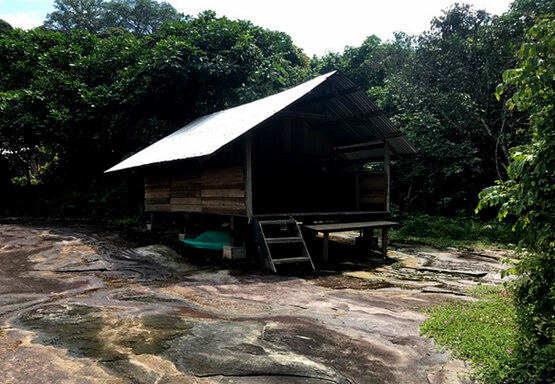
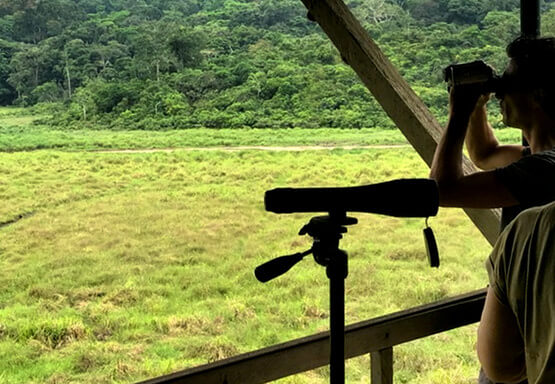
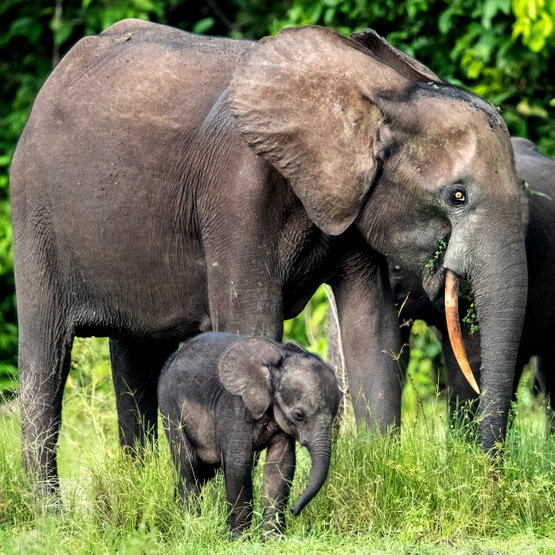
seasons
Ivindo National Park covers 3000 km2 [300,000 ha] and straddles the borders of Ogooué-Ivindo and Ogooué-Lolo provinces. Hot and steamy, the peak time to navigate Kongou Falls is from November to April.
The park’s average rainfall is 1672 mm, with the rainy seasons between September and December, and February and May. As access to Kongou Camp is by foot, you may want to visit during the short dry season. Activities are year-round, however, including your visit to Langoué Bai, where from our camp’s viewing platform, you will observe western lowland gorillas, herds of elephants and other mammals foraging on saline-rich marshlands.
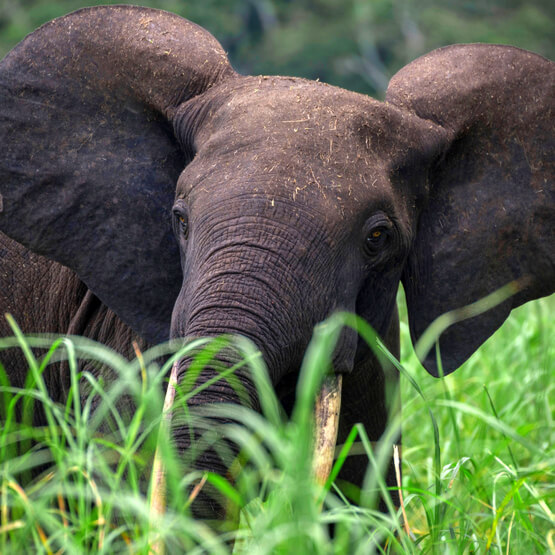
langoué baï
Ivindo’s equatorial rainforest is home to over 600 mammals and over 2,000 plant species. Undisturbed since time, herds of forest elephants, mandrills, sitatungas [antelope], colourful butterflies, over 400 bird species and the largest concentration of western lowland gorillas on the African continent live in the park’s wild, lush interior.
The saline marshes at Langoué Baï offers a rare glimpse into Africa’s last living Eden. Prized by Ivindo’s abundance of wildlife, the ancient forest clearing was only discovered in 2000 by the biologist, Dr Michael Fay on his now-famous Megatransect expedition. Enscribed as a UNESCO World Heritage-listed site, it is also the fifth largest on the African Continent. Carved by Gabon’s forest elephants over the centuries and spanning one kilometre in length; 300 metres wide, the baï also serves as the base for WSC Gabon’s Forest Program which protects and monitors populations of gorillas and elephants. Here you will see how scientists collect their field data through acoustic monitoring and by motion sensor.
Overnighting just within an hour of the baï is also a rare treat. From our three-tiered camp platform you will observe the nocturnal creatures in numbers not found anywhere else.
Further off the grid is another forest trail to the Ivindo River where canopy is pitted against canopy. In the treetops you will see monkeys scamper across an entanglement of branches as flocks of African grey parrots take off in feathery flight. And beneath the shafts of sunlight you may come across playful chimpanzees, foraging buffaloes, elephants and even gorillas in lush hideaways; secluded places where Gabon’s wild cats also quietly prowl.
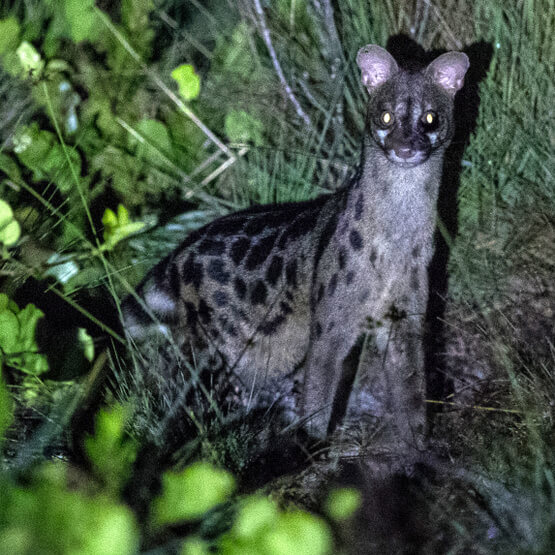
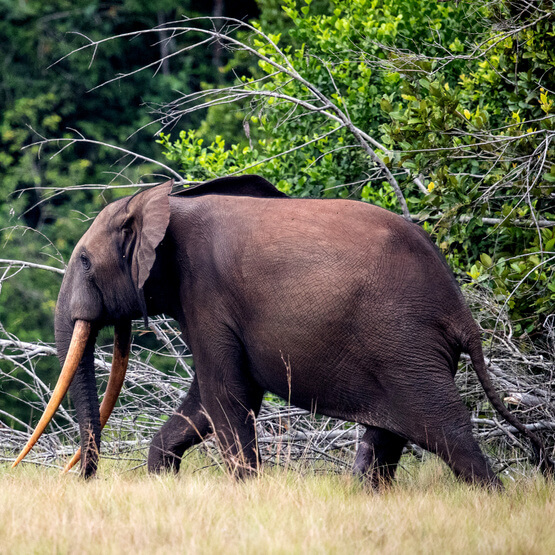
kongou falls
Two hours from Kongou Forest Camp on foot is Kongou Falls. Thundering 56 metres down and spanning three kilometres in width, Kongou’s chutes spills over 900 cubic metres per second; making it one of the most powerful waterfalls in the world along with Djidji and Mingouli — the Wonders of Ivindo. And in the midst of all of this eye-catching splendour is the abundance of wildlife that thrives in pristine habitats; forest elephants, western lowland gorillas, forest buffalo, leopard, red river hogs, duikers, civets, leopard and flocks of exotic birds.
To reach Kongou Falls, you will journey in a pirogue [dugout canoe] from the village of Loa Loa, located 17 km south of Makokou. Everywhere around you is a dense rainforest teeming with primates and forest elephant on the river banks; even pods of hippo and Nile River crocodiles, some are so close that you can almost touch.
Another place we’ll visit is Ipassa Makokou Biosphere Reserve, one of Africa’s most vital ecological refuges for Ivindo’s wildlife. There are over 2,000 species of flora; 600 species of mammals, reptiles, butterflies, endemic and rare bird species in this corner of the park — even more snapping crocodiles — a sense of place with over 15,000 [ha] of protected jungle.
At the forefront of research is the Ipassa Research Station; the oldest in Gabon now managed by Institute for Research for Tropical Ecology [IRET] which serves as the field base for Duke University’s study on Gabon’s pristine ecosystems. Today, Ipassa is part of the World Network of Biosphere Reserves.
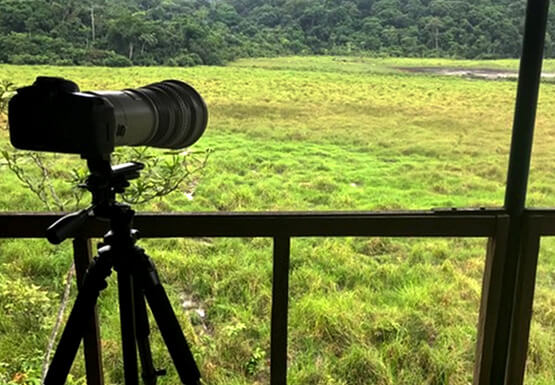
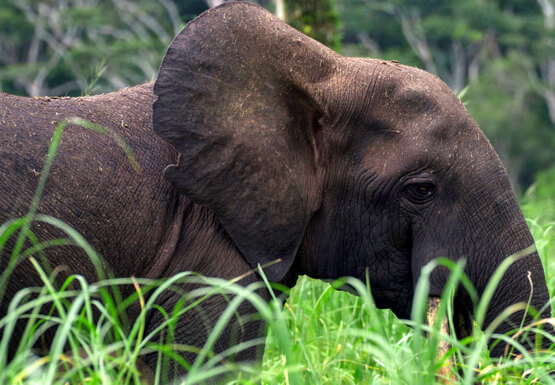
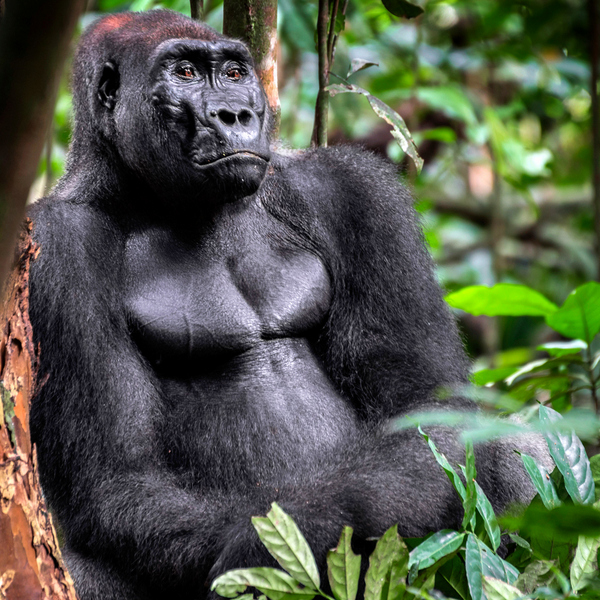
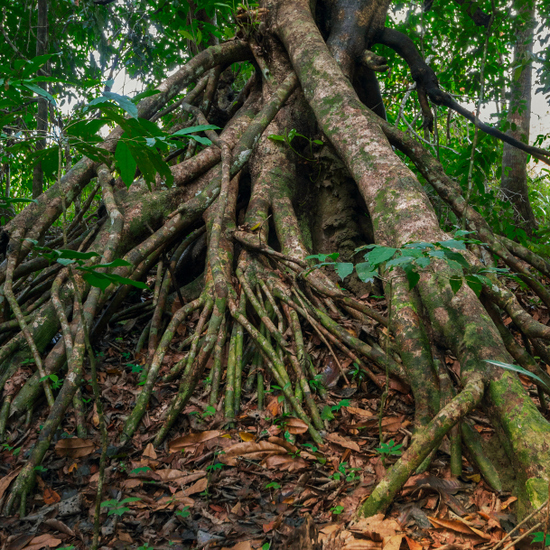
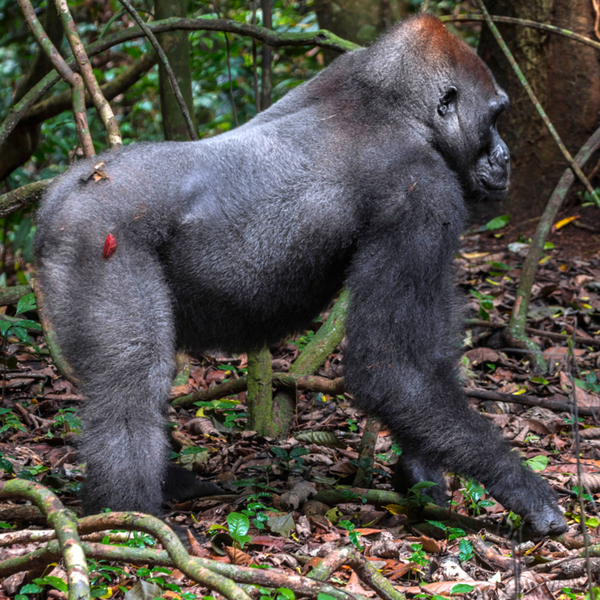
kongou forest camp
Kongou Forest Camp is an authentic ‘nature’ camp which shelters in the shade of rainforest within striking distance of Kongou Falls.
Surrounded by an exceptional diversity of wildlife and forest birds, the camp comprises five, traditional wooden buildings with three serving as guest dormitories — each outfitted with single beds and mosquito netting [maximum six guests at any one time] and another as a restaurant and bar. The camp, however, does not have electricity or hot water although there is a communal shower.
At night, with the paraffin lamps glowing around you, it is possible to sit by Ivindo River and be immersed in the sounds of the river and surrounding forest as monkeys scamper all around you.
Meals are simple dishes of local produce and fresh fish cooked over a roaring campfire. Tailored to intrepid travellers, Kongou Forest Camp forms part of the exhilarating rainforest experience.
The camp is undergoing an upgrade and is expected to reopen in July 2020, with the entire journey requiring a minimum four night stay and up to six guests.
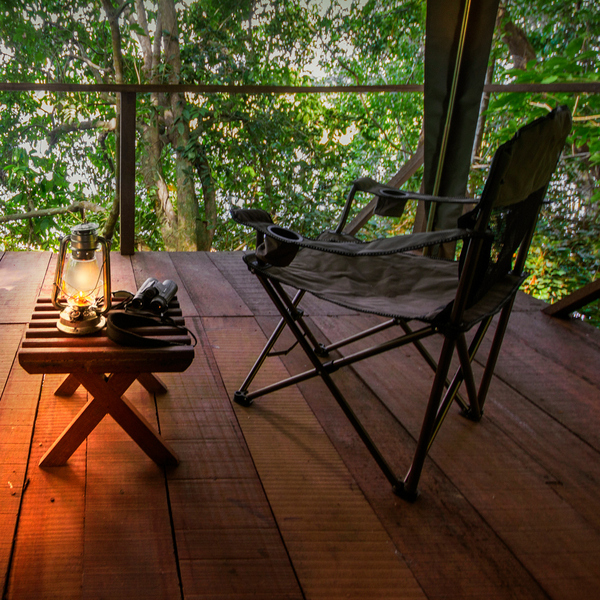
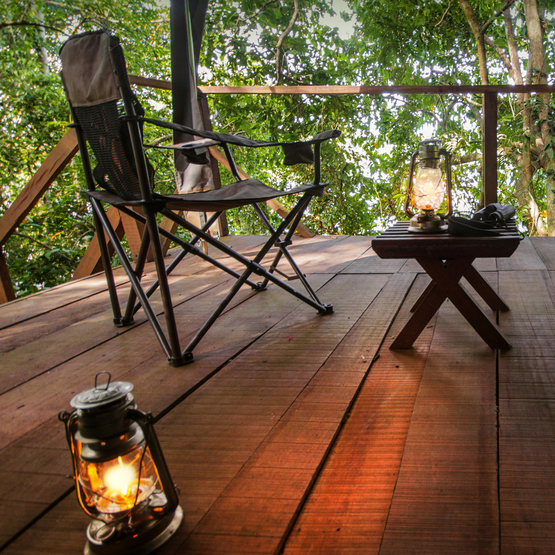
langoué baï.
For genuine intrepid explorers, Gabon Wildlife Camps & Safaris operates a single, three-tiered platform just an hour from Langoué Baï.
Accommodating up to six guests on the platform, you sleep in small but comfortable dome tents — a simple outfit punctuated by sublime views of the congregating wildlife making their way to Langoué Baï’s sea of saline marshes and rich grassland.
When you’re not looking out for the forest elephants, you’ll be listening to the sounds of cheeky monkeys and various birdlife. Perhaps you may even view a family of gorillas as you keep watch for chimpanzee, red river hog and pangolin.
Though dinner is a simple bush fare, the nocturnal soundtrack is not only vibrant but changes continuously. The only reason you will be willing to walk away from all this natural splendour is to experience the splendour of Langoué Baï, a setting where you will be hard-pressed to find anything more pristine or spectacular.
Maximum six nights and up to six guests at any one time.
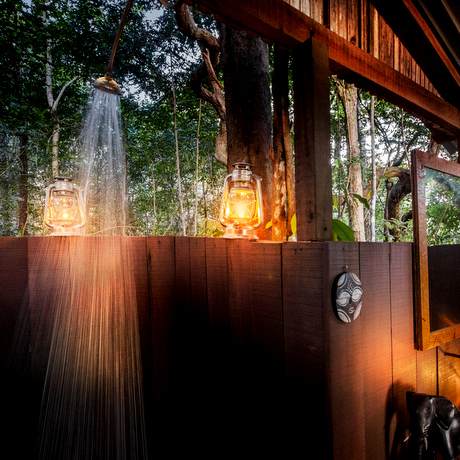
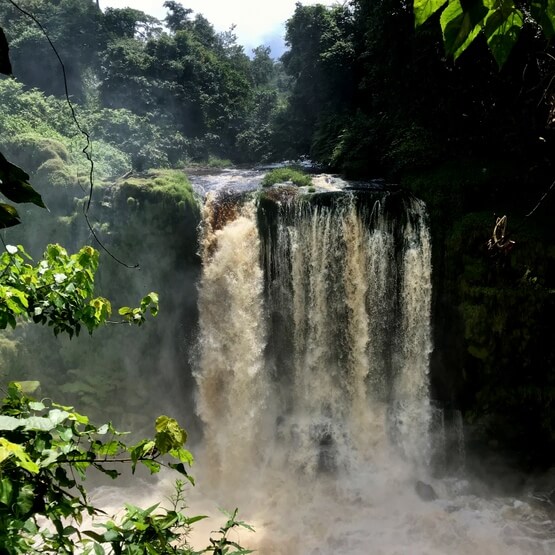
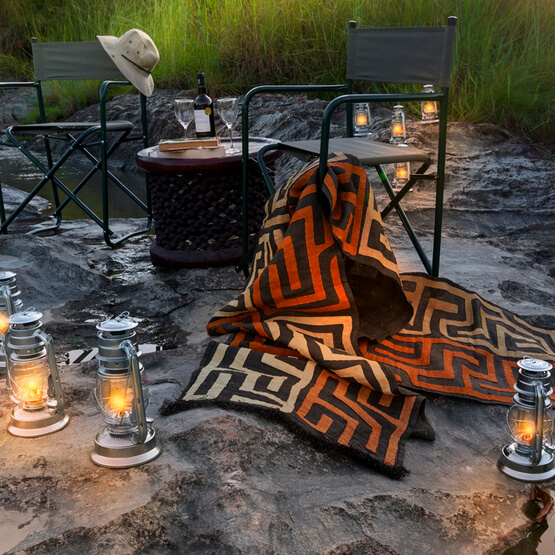
transfers
If you’re travelling to Ivindo from Libreville, The Trans Gabon Railway offers the most comfortable experience. Overnighting in the capital upon arrival to Gabon, you will then board the train the following morning, arriving at Booué, on the western boundary of the park. Though the service comes with meals, we recommend that you bring additional snacks, drinks and something to drape around your shoulders when the air-conditioning ramps up. It is also important to note that GWC will only book your passage on the express train.
For Kongou Falls: A Gabon Wildlife Camps & Safaris [GWC] driver will collect you at the station for the five-hour drive to Makokou. From here, you will continue the journey to Kongou by motorised pirogue.
For Langoué Baï: A Gabon Wildlife Camps & Safaris [GWC] driver will collect you at the station for the five-hour drive to Langoué Baï via the village of Ivindo. The drive is approximately two hours, followed by a one-hour hike to the camp. A GWC driver will also see you off at the station. Transfer arrangements from the station to your hotel or the airport in Libreville are also included.
physical
This is a highly-active trip so travellers should be in good health and are able to walk considerable distances. The three-day safari also requires you to travel in a piroque along the Ivindo River; trek to Mount Brassa and to Kongou Falls.
